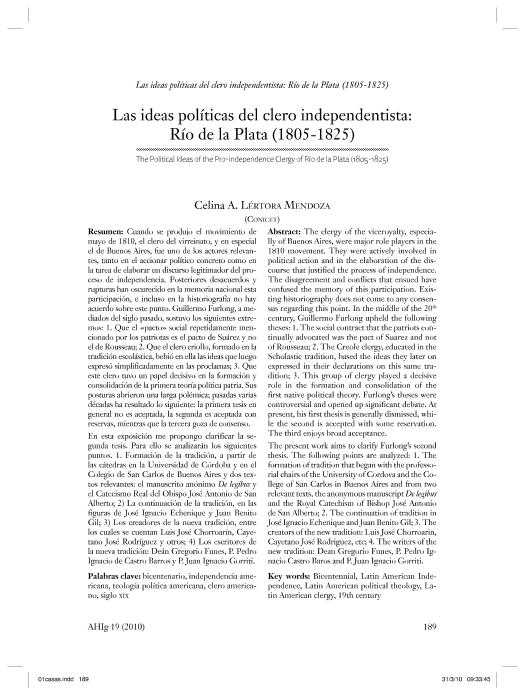Artículo
Cuando se produjo el movimiento de mayo de 1810, el clero del virreinato, y en especial el de Buenos Aires, fue uno de los actores relevantes, tanto en el accionar político concreto como en la tarea de elaborar un discurso legitimador del proceso de independencia. Posteriores desacuerdos y rupturas han oscurecido en la memoria nacional esta participación, e incluso en la historiografía no hay acuerdo sobre este punto. Guillermo Furlong, a mediados del siglo pasado, sostuvo los siguientes extremos: 1. Que el "pacto" social repetidamente mencionado por los patriotas es el pacto de Suárez y no el de Rousseau; 2. Que el clero criollo, formado en la tradición escolástica, bebió en ella las ideas que luego expresó simplificadamente en las proclamas; 3. Que este clero tuvo un papel decisivo en la formación y consolidación de la primera teoría política patria. Sus posturas abrieron una larga polémica; pasadas varias décadas ha resultado lo siguiente: la primera tesis en general no es aceptada, la segunda es aceptada con reservas, mientras que la tercera goza de consenso. En esta exposición me propongo clarificar la segunda tesis. Para ello se analizarán los siguientes puntos. 1. Formación de la tradición, a partir de las cátedras en la Universidad de Córdoba y en el Colegio de San Carlos de Buenos Aires y dos textos relevantes: el manuscrito anónimo De legibus y el Catecismo Real del Obispo José Antonio de San Alberto; 2) La continuación de la tradición, en las figuras de José Ignacio Echenique y Juan Benito Gil; 3) Los creadores de la nueva tradición, entre los cuales se cuentan Luis José Chorroarín, Cayetano José Rodríguez y otros; 4) Los escritores de la nueva tradición: Deán Gregorio Funes, P. Pedro Ignacio de Castro Barros y P. Juan Ignacio Gorriti. The clergy of the viceroyalty, especially of Buenos Aires, were major role players in the 1810 movement. They were actively involved in political action and in the elaboration of the discourse that justified the process of independence. The disagreement and conflicts that ensued have confused the memory of this participation. Existing historiography does not come to any consensus regarding this point. In the middle of the 20th century, Guillermo Furlong upheld the following theses: 1. The social contract that the patriots continually advocated was the pact of Suarez and not of Rousseau; 2. The Creole clergy, educated in the Scholastic tradition, based the ideas they later on expressed in their declarations on this same tradition; 3. This group of clergy played a decisive role in the formation and consolidation of the first native political theory. Furlong’s theses were controversial and opened up significant debate. At present, his first thesis is generally dismissed, while the second is accepted with some reservation. The third enjoys broad acceptance. The present work aims to clarify Furlong’s second thesis. The following points are analyzed: 1. The formation of tradition that began with the professorial chairs of the University of Cordova and the College of San Carlos in Buenos Aires and from two relevant texts, the anonymous manuscript De legibus and the Royal Catechism of Bishop José Antonio de San Alberto; 2. The continuation of tradition in José Ignacio Echenique and Juan Benito Gil; 3. The creators of the new tradition: Luis José Chorroarin, Cayetano José Rodriguez, etc; 4. The writers of the new tradition: Dean Gregorio Funes, P. Pedro Ignacio Castro Baros and P. Juan Ignacio Gorriti.
Las ideas políticas del clero independentista: Río de la Plata (1805-1825)
Título:
The Political Ideas of the Pro-independence Clergy of Río de la Plata (1805-1825)
Fecha de publicación:
05/2010
Editorial:
Universidad de Navarra
Revista:
Anuario de Historia de la Iglesia
ISSN:
1133-0104
Idioma:
Español
Tipo de recurso:
Artículo publicado
Clasificación temática:
Resumen
Archivos asociados
Licencia
Identificadores
Colecciones
Articulos(SEDE CENTRAL)
Articulos de SEDE CENTRAL
Articulos de SEDE CENTRAL
Citación
Lertora Mendoza, Celina Ana; Las ideas políticas del clero independentista: Río de la Plata (1805-1825); Universidad de Navarra; Anuario de Historia de la Iglesia; 19; 5-2010; 189-209
Compartir
Altmétricas




